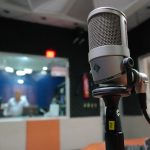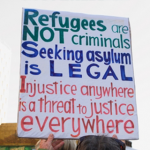Partner of Deceased Refugee Sues Australian Government

The wife of Omid Masoumali, who died after setting himself alight on April 2016 has commenced civil proceedings against the Australian Government for negligence and failing to provide adequate care.
The life and death of Omid Masoumali
Three years before his desperate act, Mr Masoumali and his partner arrived on Christmas Island after leaving Iran due to their fears of persecution.
Later that year, the pair were transferred to Nauru immigration detention centre and were granted refugee status in December 2014 – but received no further indication of when they might be able to live in Australia.
Mr Masoumali’s widow says her husband was ‘broken’ by the fact their lives were in limbo, and by the poor conditions on the island, and his mental state steadily deteriorated as a result.
The young man’s decision to set himself alight came shortly after a visit by United Nations officials, who could do little to help his situation.
Coronial Inquest into Masoumali’s death
Phone footage of a petrol-doused Masoumali pacing around a resettlement area of the island, yelling intensely then going up in a large ball of flames was played in the Brisbane Coroner’s Court earlier this year, during the inquest into his death.
It took 31 hours for him to be treated at a specialist burns unit, and he died of organ failure two days after his initial act.
The court also heard Masoumli was not given painkillers, and remained on Nauru for more than 24 hours before being airlifted to a Brisbane hospital.
At the time of his death, then immigration minister Peter Dutton claimed there was no delay in the evacuation to Australia.
“The advice that I’ve received is that there was no delay,” he told the media in April 2016.
“Obviously people realise that Nauru is 4,500km or so away from Australia. There’s a long distance involved and there were other medical issues – I’m advised – [which] presented as well, which made the decision difficult about the time to airlift this person.”
But the Coroner’s Court, which has been tasked with determining whether the young man’s death could be avoided, heard that he would have survived if airlifted sooner .
Royal Brisbane and Women’s Hospital burns specialist, Jason Miller, who treated 23-year-old Omid Masoumali when he eventually arrived in Brisbane testified that his age, and the
fact that about half his body was burned, would have meant a death rate of about would be 5%-10% under his care, and would also be the case for most major Australian metropolitan hospitals.
“The only chance he had was to have more effective care in an earlier time frame,” Dr Miller said.
After being shown photos of Mr Masoumali under care in Nauru hospital for the first time during the coroner’s hearing, Dr Miller also said that conditions were “wholly unacceptable from a clinical point of view.”
Widow’s lawsuit filed in the Victorian Supreme Court
Omid Masoumali’s widow is now suing the Australian government, and the company that provided medical services to refugees on Nauru, for failing their duty of care to her husband and herself.
Her lawsuit, filed in the Victorian Supreme Court, alleges that the medical company International Health and Medical Services (IHMS) had a specialist clinic on the island that could stabilise emergency patients, but never transferred Mr Masoumali into it.
The lawsuit says the Australian government owed Mr Masoumali a duty of care because it was “responsible for the detention, maintenance and care of asylum seekers” on Nauru, and had also hired IHMS to provide medical and evacuation services.
“At all relevant times the first and second defendants owed a duty of care to the deceased and the plaintiff, [and they] breached the duty of care,” it said.
Class Action suit filed on behalf of asylum seekers and refugees
In December last year, National Justice Project principal solicitor George Newhouse filed two class actions with the High Court of Australia, claiming the federal government’s treatment of asylum seekers and refugees in offshore detention amounts to crimes against humanity and torture.
The two separate lawsuits relate to the around 1,200 detainees still being held in offshore detention. One case is on behalf of those who were sent to Nauru and the other represents those asylum seekers now at the East Lorengau refugee transit centre on Manus Island.
The class action asserts that the Australian government has breached its duty of care in detaining these people in deplorable conditions on these islands, and that in subjecting the detainees to these conditions the government has perpetrated crimes against humanity, as well as torture and inhumane acts, as defined by the International Criminal Court.
Australians have long been critical of The Government’s treatment of asylum seekers and refugees upon hearing stories of the physical and emotional abuse suffered by detainees as well as the deplorable conditions they are forced to live in, but rather than yield to the criticism, In 2015 the government passed the Australian Border Force Act, making it against the law for any staff member within offshore detention to make an “unauthorised disclosure” – that is, speak publicly about conditions inside the camps.
Last year, the UN called on Australia to shut down Nauru. As of 31 December 2018, there were still 10 asylum seekers in the island’s detention centre.








